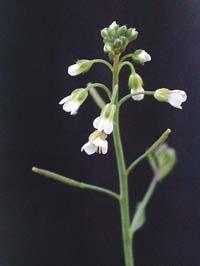Small RNA fragments capable of repairing DNA

A group of researchers at the École Normale Supérieure in Paris have found that small fragments of RNA can add methyl groups to the Arabidopsis thaliana plant where it needs DNA.
Methyl groups may have different functions in DNA, such as silencing the expression of a particular gene. Thus, plants that do not have enough methyl groups present problems in some of the genome's functions.
In the plant of Arabidopsis thaliana, when the gene called DDM1 suffers a mutation, the plant's DNA contains many fewer methyl groups retained. The Paris groups took some plants with mutations in the DDM1 gene and crossed them with others that had no mutations. They observed that the descendants who made this crossing and who passed generations did not receive mutations had recovered some fragments of DNA, that is, their ancestors in some areas where there were no methyl groups had them.
When analyzing the mechanism behind it, it was observed that small fragments of RNA were associated with DNA fragments that recovered the methyl group. Moreover, they found that the unrecovered parts did not connect any piece of RNA, and that the plants that had not recovered any of the pieces of DNA did not create that piece of RNA.





